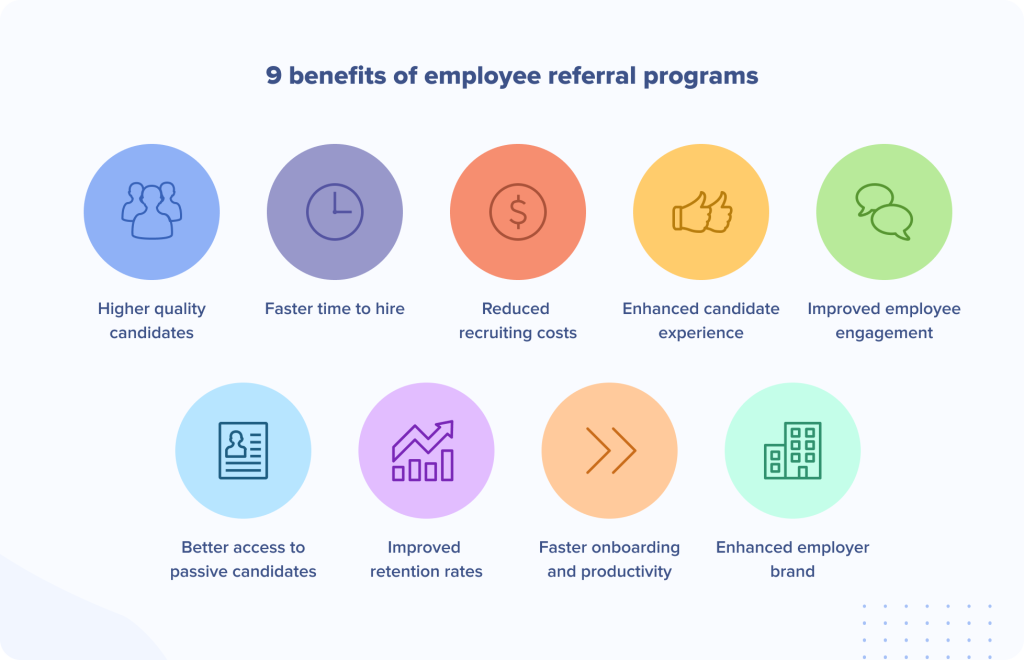
Subscribe for updates
Get talent acquisition best practices, trends, and news delivered directly to your inbox.
By entering your email, you agree to receive marketing emails from JobScore
Finding the right candidates is a constant challenge for most organizations, with 74% of employers saying they struggle to find skilled talent. But hiring teams are increasingly tasked to do more with less, leaving little time or budget to expand their talent acquisition efforts.
There may be a powerful solution hiding in plain sight: Your current team members. The people who already work for you represent an untapped network of potential connections to your next great hire. Employee referral programs formalize this network, incentivizing your team to recommend qualified candidates from their professional circles.
These programs don’t require fancy technology or massive budgets. They can be launched with minimal resources while delivering impressive results.

1
Higher quality candidates
Your team members won’t risk their professional reputation by recommending someone they know isn’t qualified or wouldn’t fit in. On the contrary, they often pre-screen candidates to help you build a higher quality talent pipeline.
Your team members understand your company’s expectations, work environment, and team dynamics — and they know what it takes to succeed in your organization. This firsthand experience helps them refer candidates who align with your organization’s needs and culture.
In fact, companies that use employee referrals are two times more likely to improve their quality of hire.
2
Faster time to hire
Lengthy hiring processes can lead to lost productivity, project delays, and team burnout as others cover the workload. Referral programs can accelerate your hiring timeline by shortening or eliminating several steps in the traditional recruiting process.
For example:
Nearly two-thirds of companies (62%) that consistently invest in employee referrals reduce their time to hire.
3
Reduced recruiting costs
Traditional recruiting methods can get really expensive once you add up job board postings, recruitment agency fees, and advertising costs — especially for hard to fill positions. Employee referral programs can deliver significant return on investment compared to these other recruiting channels.
The cost savings come from multiple factors:
It’s clear why 84% of companies believe employee referrals are the most cost-effective way to find talent.
4
Enhanced candidate experience
Referred candidates benefit from having an inside connection who can provide information about the role, team dynamics, and interview process. This insider guidance helps them prepare more effectively and reduces anxiety about unknowns. They can ask questions they might hesitate to ask recruiters or hiring managers, resulting in more transparent communication throughout the process.
Offering a personalized, transparent recruiting process can be a meaningful differentiator for quality candidates, leading to higher offer acceptance rates and stronger initial engagement.
5
Improved employee engagement
Referral programs do more than just help you hire — they can also boost engagement among your current team.
People like to work alongside others they know and trust. When team members successfully refer friends or former colleagues, they create a more personally rewarding work environment for themselves. This opportunity to build their team with trusted connections can increase job satisfaction and deepen their connection to your organization.
In turn, higher employee engagement can lead to higher customer loyalty, increased productivity, and increased profitability.
6
Better access to passive candidates
Some of the best potential hires may not be actively looking for new opportunities — so they won’t respond to job postings or recruiter outreach. But they might respond to a personal connection who can vouch for your organization.
Your team members can advocate for your company in authentic ways that formal recruiting channels cannot. They share genuine experiences and specific examples that resonate with potential candidates. This peer-to-peer communication is inherently more credible and persuasive than company-generated recruiting content, helping you reach high-quality passive candidates who aren’t actively interviewing elsewhere.
7
Improved retention rates
Team members who join your company through referrals tend to stay longer than those hired through other methods.
That’s because referred candidates:
This improved retention creates stability, reduces turnover costs, and builds institutional knowledge within your organization.
8
Faster onboarding and productivity
Stronger internal connections can help referred hires reach full productivity faster than candidates from other sources.
New hires from referrals have several advantages that speed their integration and productivity:
9
Enhanced employer brand
Referral programs help build your reputation as an employer through authentic word-of-mouth advocacy from current team members.
When team members actively refer candidates to your company, they’re putting their personal reputation behind their recommendation. This organic advocacy creates credibility that you simply can’t achieve on your own. Potential candidates trust the perspectives of people they know far more than official company messaging.
Referral programs also encourage team members to articulate what they value about working for your company. To persuade friends and connections to apply, your team members naturally highlight the authentic benefits and opportunities your organization offers. This peer-to-peer messaging often resonates more effectively than formal recruitment materials.
Final thoughts on the benefits of employee referral programs
Employee referral programs offer compelling benefits for organizations who want to build high-quality teams with limited resources.
What makes referral programs particularly valuable is their accessibility and scalability. You don’t need enterprise-level resources or sophisticated systems to launch an effective program. Basic referral initiatives run through your applicant tracking system with modest incentives can generate significant results when implemented thoughtfully.
The key to success lies in active management and clear communication. Your team members need to understand what positions you’re hiring for, what makes a good candidate, and how the referral process works. Regular updates and recognition of successful referrals maintain momentum and engagement with the program.
Start small if necessary, but start. You might begin with referral bonuses for just your most critical positions or with non-monetary recognition for successful referrals. As you see results, you can expand the program and refine your approach based on what works best for your team.
Remember that your current team members represent your most credible and cost-effective recruiting channel. They know your company, understand your culture, and have a vested interest in bringing in great colleagues. By activating and incentivizing their networks through a structured referral program, you transform your hiring approach and build a high-quality team.



